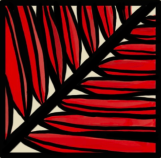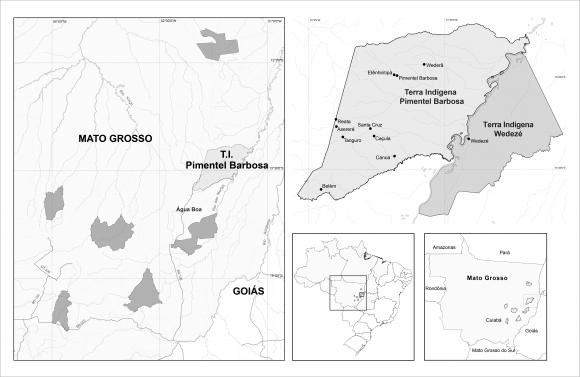Wena mawe'aiwi!
Bem vindo/Welcome!
Rowasu'u é um projeto de arquivo digital atualmente em desenvolvimento por um grupo de comunidades A'uwẽ (Xavante) no Brasil Central e uma equipe de pesquisadores do Brasil e dos Estados Unidos. Seis comunidades da Terra Indígena Pimentel Barbosa no Mato Grosso estão participando dessa fase de reforço e desenvolvimento. Esperamos expandir o alcance do projeto para outras comunidades A'uwẽ e Terras Indígenas nos próximos anos.
Atualmente, há mais de 20.000 A'uwẽ, a maioria dos quais residem em Terras Indígenas (TIs, Terras Indígenas) reconhecidas no estado de Mato Grosso. Este projeto atenderá diretamente a TI Pimentel Barbosa, lar de aproximadamente 2.600 pessoas.
Este projeto busca retornar fac-símiles digitais de uma ampla gama de materiais, incluindo fotografias, gravações de áudio, publicações científicas e artefatos de museu que foram criados e produzidos por pesquisadores não originais nos últimos 60 anos. Rowasu'u colocará o controle sobre esses objetos científicos digitais nas mãos das comunidades A'uwẽ e dos membros da equipe do projeto A'uwẽ. Você notará que muito poucas imagens de pessoas ou itens de patrimônio digital estão disponíveis no momento. Isso ocorre porque os membros da equipe A'uwẽ ainda precisam revisar, alterar e/ou aprovar os protocolos culturais e programas neste site.
Histórico dos Pesquisadores:
Desde o final da década de 1950, grupos de pesquisadores trabalharam em comunidades indígenas em áreas como genética humana, linguística, saúde pública e antropologia. Grande parte do trabalho produzido desde então foi armazenado em coleções pessoais de pesquisadores, arquivos institucionais e bibliotecas fora do alcance das pessoas que eles documentam. Os materiais incluem milhares de fotografias, horas de gravação de áudio e uma bibliografia de mais de 800 publicações acadêmicas.
Precedentes:
Rowasu'u surge a partir de projetos anteriores de documentação cultural, incluindo o ProDocult , apoiado pelo Museu do Índio no Rio de Janeiro. Os membros do projeto A'uwẽ incluem o coordenador Tsuptó Buprewêm Wa'iri Xavante, Romeu Xavante, Lincon Dure'we Xavante e Marco Aurélio Serenho Ihi Xavante. Os membros não pertencem ao projeto A'uwẽ incluindo o coordenador James R. Welch, Rosanna Dent e Carlos EA Coimbra Jr.
Plataforma e soberania de dados A'uwẽ:
Este site foi criado usando o Mukurtu Content Management System. Esta plataforma de código aberta foi desenvolvida especificamente para facilitar o acesso e o controle dos indígenas sobre o conteúdo digital. Saiba mais sobre o Mukurtu aqui . Ele permite que as comunidades participantes disponibilizem objetos digitais para partes interessadas específicas de acordo com protocolos culturais sobre visualização e uso do conteúdo. Usando o Mukurtu, os membros da comunidade determinam a visibilidade dos materiais no Rowasu'u. No protocolo atual do site, apenas os materiais que os membros da comunidade já solicitaram são acessíveis aos visitantes públicos.
A equipe do projeto está trabalhando para garantir que Rowasu'u cumpra os mandatos dos Princípios CARE de Soberania de Dados Indígenas, desenvolvidos pela Aliança Global de Dados Indígenas.
Membros da comunidade participantes:
- Pimentel Barbosa
- Aquilino Serenirono Xavante (Pesquisador)
- Josi Wau Xavante (Pesquisadora)
- Márcio Seremãhörö Xavante (Pesquisador)
- Tsuptó Buprewem Wa'iri Xavante (Conselheiro)
- Etẽnhiritipa
- Cecília Xavante (Pesquisadora)
- Hanndall Siwari Wairi (Pesquisador)
- Laimete Danhimitobrewe (Pesquisador)
- Sávio Tsidowi Xavante (Pesquisador)
- Jurandir Siridiwê Xavante (Conselheiro)
- Paraíso
- Olinda Ro'ozani (Pesquisadora)
- Karielli Wautó (Pesquisadora)
- Valdinho R. P. (Pesquisador)
- José Tserewatsi Xavante (Conselheiro)
- Sõ'reprẽ
- Iracema Penewê (Pesquisadora)
- Leoni Bruwa'a (Pesquisador)
- Romildo Xavante (Pesquisador)
- João Tseredzabdi (Conselheiro)
- Santa Vitória
- Abrão Waudzuriwe Xavante (Pesquisador)
- Denilson Monozopruwe Xavante (Pesquisador)
- Lincon Dure'we Xavante (Pesquisador)
- Wautomonhini'õ Nipru Xavante (Conselheira)
- Adauto Tserewipo (Conselheiro)
- Wederã
- Denise Wautomonini'õ Xavante (Pesquisadora)
- Erlie Runhamri (Pesquisador)
- Rolf Tsirahbri Xavante (Pesquisador)
- Mara Barreto Sinhosewawe Xavante (Pesquisadora)
- Paulo Cipassé Xavante (Conselheiro)
Os membros da Equipe de Pesquisa A'uwẽ e os membros do Conselho de Supervisão A'uwẽ foram determinados pelas comunidades participantes.
Equipe de pesquisa não A'uwẽ (em ordem alfabética):
- Rosanna Dent (New Jersey Institute of Technology)
- Laura Graham (University of Iowa)
- Lori Jahnke (Emory University)
- Ricardo Ventura Santos (Escola Nacional de Saúde Pública – Fiocruz)
- James R. Welch (Escola Nacional de Saúde Pública – Fiocruz)
Colaboradores:
- Caio Bibiani
- Carlos E.A. Coimbra Jr. (Escola Nacional de Saúde Pública – Fiocruz)
- Gislaine Recaldes de Abreu (Universidade Federal de Mato Grosso de Sul)
Pesquisadores Estudantes:
- Mansi Hitesh (Emory University)
- Meghan Kinkade (New Jersey Institute of Technology)
- Micah Demerest (New Jersey Institute of Technology)
- McKenna Jacquemet (University of Iowa)
- Nikita Nair (New Jersey Institute of Technology)
- Kyle Tanaka (Emory University)
Ex-alunos do Projeto:
- Sofia Usmani (New Jersey Institute of Technology, 2023-2024)
- Varun Pai (New Jersey Institute of Technology, 2020-2023)
- Atishree Desai (New Jersey Institute of Technology, 2022-2023)
- SJ Dillon (Emory University, 2020-2021)
- Jada Evans (New Jersey Institute of Technology, 2020-2022)
- Pia Kapoor (New Jersey Institute of Technology, 2020-2022)
- Shareef Syed (New Jersey Institute of Technology, 2020-2021)
- Monica Welch (New Jersey Institute of Technology, 2020)
Financiamento:
Este projeto é possível graças ao generoso apoio de uma bolsa da National Science Foundation (# 2147284 ). Opiniões, descobertas, apresentações ou recomendações expressas neste material não refletem necessariamente as opiniões da National Science Foundation.
Também somos gratos pelo Faculty Seed Grant do New Jersey Institute of Technology, 2019-2021.
Atualmente, o conteúdo é limitado ao acesso público enquanto os itens são restritos e os representantes da comunidade. Aqui determinamos protocolos de compartilhamento culturalmente informados.

